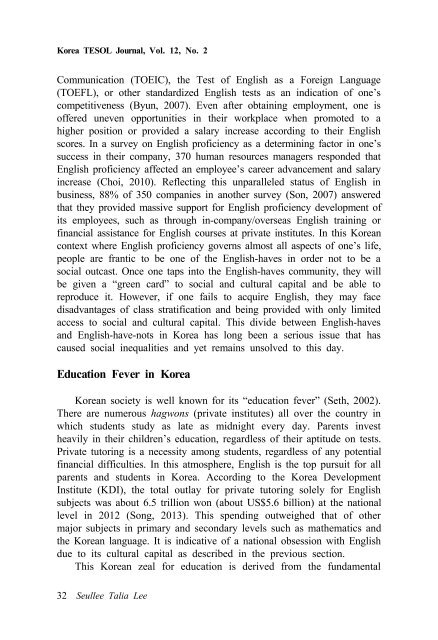Korea TESOL Journal
KTJ12-2web
KTJ12-2web
Create successful ePaper yourself
Turn your PDF publications into a flip-book with our unique Google optimized e-Paper software.
<strong>Korea</strong> <strong>TESOL</strong> <strong>Journal</strong>, Vol. 12, No. 2<br />
Communication (TOEIC), the Test of English as a Foreign Language<br />
(TOEFL), or other standardized English tests as an indication of one’s<br />
competitiveness (Byun, 2007). Even after obtaining employment, one is<br />
offered uneven opportunities in their workplace when promoted to a<br />
higher position or provided a salary increase according to their English<br />
scores. In a survey on English proficiency as a determining factor in one’s<br />
success in their company, 370 human resources managers responded that<br />
English proficiency affected an employee’s career advancement and salary<br />
increase (Choi, 2010). Reflecting this unparalleled status of English in<br />
business, 88% of 350 companies in another survey (Son, 2007) answered<br />
that they provided massive support for English proficiency development of<br />
its employees, such as through in-company/overseas English training or<br />
financial assistance for English courses at private institutes. In this <strong>Korea</strong>n<br />
context where English proficiency governs almost all aspects of one’s life,<br />
people are frantic to be one of the English-haves in order not to be a<br />
social outcast. Once one taps into the English-haves community, they will<br />
be given a “green card” to social and cultural capital and be able to<br />
reproduce it. However, if one fails to acquire English, they may face<br />
disadvantages of class stratification and being provided with only limited<br />
access to social and cultural capital. This divide between English-haves<br />
and English-have-nots in <strong>Korea</strong> has long been a serious issue that has<br />
caused social inequalities and yet remains unsolved to this day.<br />
Education Fever in <strong>Korea</strong><br />
<strong>Korea</strong>n society is well known for its “education fever” (Seth, 2002).<br />
There are numerous hagwons (private institutes) all over the country in<br />
which students study as late as midnight every day. Parents invest<br />
heavily in their children’s education, regardless of their aptitude on tests.<br />
Private tutoring is a necessity among students, regardless of any potential<br />
financial difficulties. In this atmosphere, English is the top pursuit for all<br />
parents and students in <strong>Korea</strong>. According to the <strong>Korea</strong> Development<br />
Institute (KDI), the total outlay for private tutoring solely for English<br />
subjects was about 6.5 trillion won (about US$5.6 billion) at the national<br />
level in 2012 (Song, 2013). This spending outweighed that of other<br />
major subjects in primary and secondary levels such as mathematics and<br />
the <strong>Korea</strong>n language. It is indicative of a national obsession with English<br />
due to its cultural capital as described in the previous section.<br />
This <strong>Korea</strong>n zeal for education is derived from the fundamental<br />
32 Seullee Talia Lee



